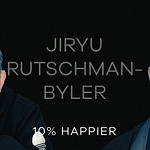Anyone with a passing familiarity with Buddhism will know that “delusion” is rarely, if ever, mentioned in a positive way. In fact, the Buddha included delusion (aka: confusion about the way things really are) on his list of “the three poisons.” The whole point of meditation, per the Buddha, is to uproot delusion — along with greed and hatred. Only then can you be enlightened.
My guest today is here to valiantly make the case that delusion — or self-deception — has an upside. Many upsides, in fact. While he concedes that self-deception can, of course, be massively harmful, he argues that it also plays a vital role in our success and wellbeing, and that it holds together friendships, marriages, and nations. Understanding this, he says, can make you happier, more effective, and — crucially — more empathetic with people with whom you disagree.
Shankar Vedantam is the host of the popular podcast and radio show Hidden Brain. His latest book is called Useful Delusions: The Power and Paradox of the Self-Deceiving Brain.
In this episode we talk about:
the many ways our brains filter and alter our perception of reality
why we evolved for a robust capacity to lie to ourselves
and how his research on delusions has colored his view of the chaos and confusion of our modern world.
Episode cheatsheet
The big takeaway
Shankar Vedantam makes the counterintuitive case that some self-deception, while dangerous at times, can also play a vital role in our well-being, relationships, and society at large. By understanding the evolutionary and psychological roots of our delusions, Shankar argues, we can become more empathetic, effective, and even happier, both with ourselves and with those who see the world differently.
How lying to yourself (a little) can boost your happiness, relationships, and empathy
Key takeaways:
Self-deception isn’t always the villain: While excessive delusion can be harmful, especially in abusive or unjust situations, the little lies we tell ourselves (and each other) often help us cope, persevere, and nurture relationships.
Filtering reality keeps us sane: Our brains heavily filter sensory information and sometimes create positive illusions (about loved ones or ourselves) that help us function and stay motivated.
Delusions hold groups (and even nations) together: Shared stories, myths, and collective beliefs—though not always objectively true—are often essential for social cohesion and resilience.
The line between harmful and helpful delusion isn’t always obvious: Discerning which self-deceptions nurture and which ones hurt takes mindful awareness, empathy, and a willingness to see the outcomes of our beliefs.










